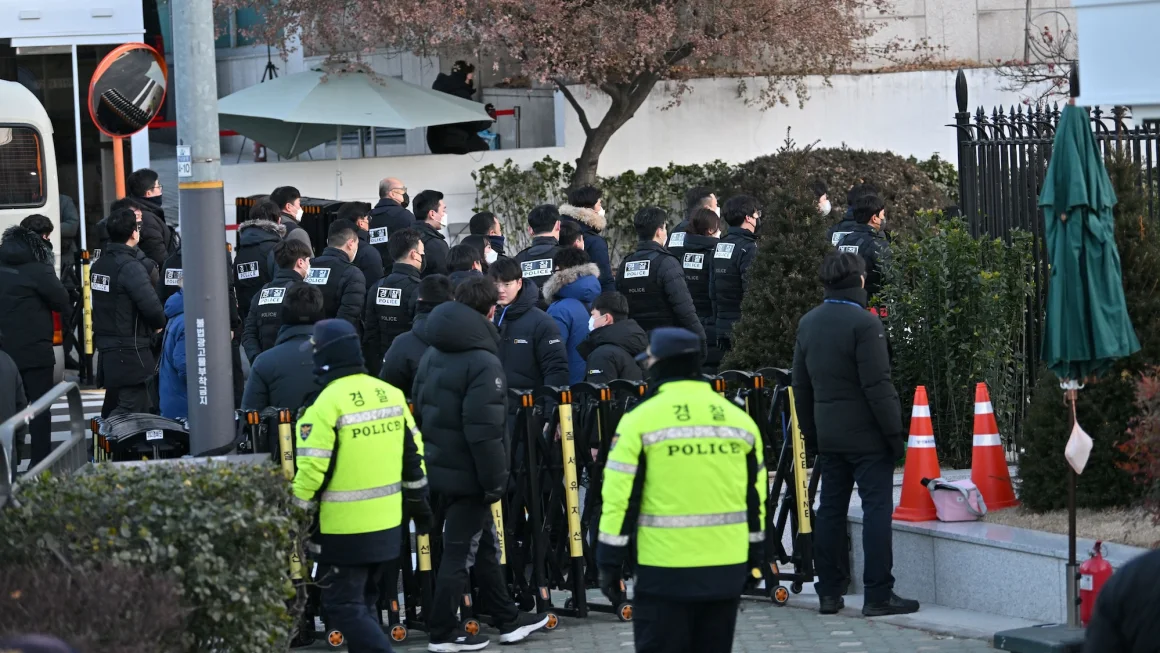South Korean investigators suspend efforts to detain president after dramatic standoff

Seoul, South KoreaCNN —
South Korean investigators have suspended efforts to enforce an arrest warrant for embattled President Yoon Suk Yeol on Friday, hours into a standoff in which authorities tried to detain the leader following his short-lived martial law declaration.
Some 80 police and investigators entered the presidential residence compound in Seoul early morning and were blocked by the presidential security team from carrying out the warrant, South Korea’s Corruption Investigation Office (CIO) told CNN – deepening their showdown with defiant and embattled Yoon.
The CIO called off the arrest warrant enforcement Friday afternoon citing the safety of the people on the ground, according to a statement. The warrant, which is valid until January 6, remains in effect and could be extended.
Heavy police presence was seen on streets near Yoon’s residence as hundreds gathered to support the leader, who plunged the nation into political chaos with his swiftly overturned declaration one month ago
The president is wanted for questioning in multiple investigations, including accusations of leading an insurrection – a crime punishable by life imprisonment or even the death penalty.
A court earlier this week approved the warrant for Yoon – the first time such action has been taken against a sitting president. In response, the presidential security team said that security measures “will be taken in accordance with due process.”
Yoon, himself a former prosecutor, has refused to answer three summonses by investigators in recent weeks asking for his cooperation, according to the CIO.
After suspending efforts to detain Yoon, the CIO expressed “deep regret” at “the suspect’s attitude of not following the process by law” and said they would decide on next steps.
The leader was stripped of presidential powers last month by a parliamentary vote to impeach him. Members of his own party turned on him following his refusal to resign over his short-lived decree, which was met with widespread public backlash.
Crowds of diehard supporters were gathered near the presidential residence despite frigid temperatures, with some camping there overnight. Many of those backing the leader – widely seen as a conservative firebrand and staunch US ally tough on China and North Korea – held signs with the phrase “Stop the steal” printed in English, while others waved American flags.
Other supporters held placards describing his arrest as treason, while some shouted that they should push through the barricade set up by police and chanted: “Arrest the CIO.”
Supporters of suspended South Korean President Yoon Suk Yeol gathered near his residence in Seoul on January 3. Philip Fong/AFP/Getty Images
An hour after investigators moved to enforce the warrant, the main opposition party released a statement urging the presidential security team to cooperate and “firmly refuse” any unlawful orders.
The Democratic Party called on Yoon to “walk out of your residence, where you are cowardly hiding, and be obedient with the execution of your arrest warrant.”
“All members of the Republic of Korea need to abide by law and order,” the statement said.
In a separate statement, Yoon’s lawyer reiterated the arrest warrant was “an illegal, invalid warrant” and vowed to take legal action against its execution.
Yoon’s defense team on Tuesday filed an injunction with the Constitutional Court to suspend the warrant, as well as a separate objection filed to a lower court over the warrant.
If taken into custody, Yoon can be held for up to 48 hours for questioning with the existing warrant issued by the court in relation to charges of abuse of authority and leading an insurrection. The CIO would need to apply for a secondary warrant within that period to detain him further.
A defiant Yoon
The suspended president has remained defiant in the face of investigations and an impeachment trial underway by one of the country’s highest courts, vowing in a statement Thursday to “fight to the end” for the country.
The statement was his first public comment in weeks after he largely stayed away from public view during the fallout from his widely condemned decree.
Yoon declared martial law in a surprise late-night address on December 3, claiming opposition lawmakers had “paralyzed state affairs” and that the move was necessary to “safeguard a liberal South Korea” from the threats posed by “anti-state elements.”
Members of the National Assembly, including some from Yoon’s own party, voted to reverse the declaration some six hours later. Yoon’s order faced fierce backlash from the public and lawmakers across the political spectrum, reviving painful memories of the country’s authoritarian past.
In the weeks since, the country has been in political disarray with parliament also voting to impeach its prime minister and acting president Han Duck-soo, just weeks after it voted to impeach Yoon. The finance minister Choi Sang-mok is now acting president.



0 Comments